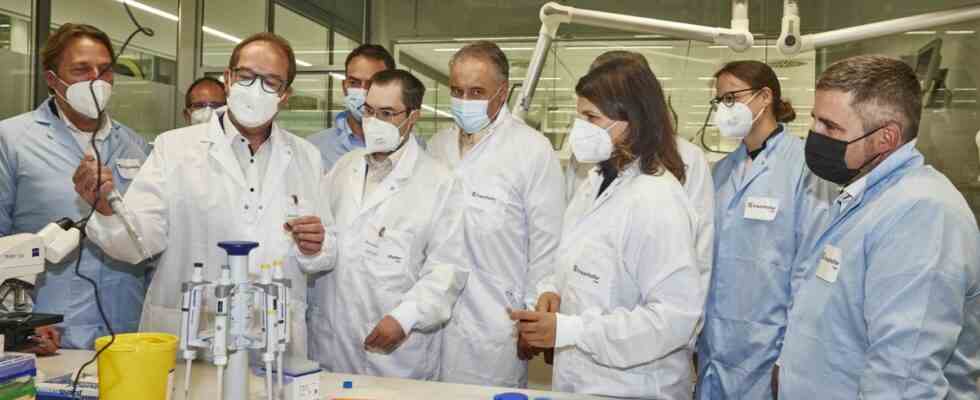Nine employees work in the laboratories rented from Roche. Four more researchers are in the recruitment process. There are currently eight other vacancies.
(Photo: Manfred Neubauer)
Worldwide impetus for medical research into infections and diagnostic procedures should come from Penzberg. The chairman of the CSU state group in the Bundestag, Alexander Dobrindt, spoke of a “new center of a global network in immunology research” when he visited the new location of the Fraunhofer Institute in Nonnenwald, which was founded just six months ago, on Monday afternoon. In just a few years, around a hundred scientists could be working there on questions of immunology, infection and pandemic research. So far, nine employees work in laboratories rented from the biotechnology company Roche. Site manager Michael Hoelscher calculated optimistically that the foundation stone for his own building in Penzberg could possibly be laid as early as 2023.
In order to get an insight into what has happened at the new Fraunhofer location since May, Dobrindt, his deputy in the CSU state group in the Bundestag, Katrin Staffler, and the mayor of Penzberg, Stefan Korpan (CSU), came. They found out on the spot that a lot had already been initiated. Seven researchers have already become nine, four more are in the recruitment process, and eight positions are currently being advertised.
The employees need modern equipment for research. The microscope is also used.
(Photo: Manfred Neubauer)
Alexander Dobrindt confirmed that he intends to continue to support the institution financially.
(Photo: Manfred Neubauer)
According to site manager Hoelscher, who is also director of the Department of Infectious and Tropical Medicine at the Ludwigs-Maximilians-Universität (LMU) hospital in Munich, the employees should identify new pathogens, including specifically those that are common in the animal world. In cooperation with Roche, they want to develop diagnostic methods, vaccines and therapeutic approaches as quickly as possible in the event of another pandemic. “Anyone who has already worked with similar pathogens can make faster progress,” explained Hoelscher. This has also been shown with corona viruses. “We want to launch a global sample collection.” The pandemic has taught us how important it is to maintain networks among researchers. Personal contacts have therefore already been made from the Penzberg institute location, for example to Ethiopia or Tanzania. The network should be expanded worldwide, students trained, samples exchanged and joint proficiency tests organized.
According to Hoelscher, the location in Penzberg is ideal for the new Fraunhofer Institute. In addition to Roche, the facility has gained the LMU and its clinic in Munich-Großhadern as partners. The largest biotech location in Europe is located around the state capital. This offers great potential for scientifically successful work and close exchange with institutions in the public health system, said Hoelscher. The Fraunhofer Institute is researching, for example, developing new decentralized and digitally networked test devices in order to be able to combine data better.
The facility is currently working on two new projects. The aim is to improve the diagnostic procedures for a globally occurring pathogen. New test procedures are being evaluated with two companies. As Gerd Geisslinger, head of the Fraunhofer Institute for Translational Medicine and Pharmacology (ITMP) docked to the Penzberg site, explains, this is characteristic of the activities of his company. Less than 30 percent of the research funds used came from basic funding. The rest is generated through public research projects and cooperation with industry. “Drugs and therapies have to reach the patient.” According to Geisslinger, this is the only way to create innovations.
The federal and state governments have granted 80 million euros in funding for the development of the Fraunhofer site in Nonnenwald. “We continue to be available as a partner, even when it comes to supporting you financially,” affirmed Dobrindt. A global database with which scientists in infection and pandemic research could work is desirable. The world is so interconnected that mankind comes into contact with even the rarest pathogens. “Prevention is the key issue,” said Dobrindt. Katrin Staffler emphasized that she couldn’t imagine a better stop for her “Future Made in Bavaria” tour. “Bringing research into applications fills you with life,” said the politician for science and research in the Bundestag. “You are a role model and a beacon.”
According to Hoelscher, a new building as a diagnostics center is also being built at the LMU Clinic in Munich-Großhadern for global networking. In Penzberg, a laboratory building for Fraunhofer could be ready by 2025. “Then nothing stands in the way of an independent institute.”

